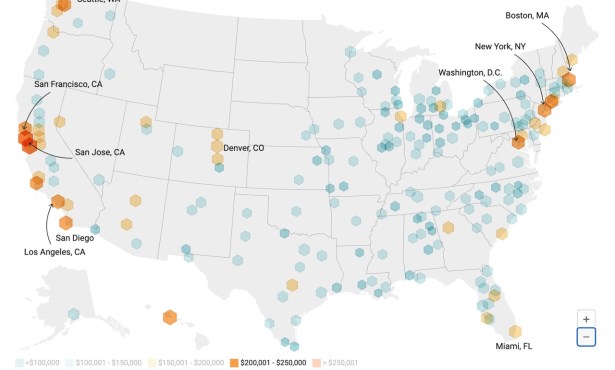S.B. Bank & Trust Loss Due to Tract Developments
President George Leis Says Capital Base Strong Despite Failed Projects

Santa Barbara Bank & Trust posted a large net loss, of $362.6 million, for the second quarter of 2009. This compares to a net loss of $5.9 million in the same quarter of 2008.
George Leis, the president and CEO of SBB&T and its holding company, Pacific Capital Bancorp, said the most significant loss was in the arena of residential tract construction in locales with many acres of undeveloped or newly developed land. These include Oxnard, Santa Maria, Reno, and the Central Valley. When they found their projects were not selling, a number of these developers defaulted on their loans or restructured them.
Many of those tract developers were longtime, reliable SBB&T loan customers whom the bank had “followed” to these relatively undeveloped frontiers, Leis said. “Their houses are just sitting empty in those places,” he added. On the bright side, Leis noted, most of the nonperforming or underperforming loans were real-estate secured. “We still have the property and the cooperation of the borrowers,” he said.
Santa Barbara Bank & Trust did not did not go in for the exotic financial instruments, such as derivatives, that have been blamed for amplifying the real-estate loan defaults and the economy’s downturn. “It is a testament to our company’s strength and focus,” Leis said, “that we never got into those kinds of things – financially engineered investing, sub-prime mortgages. It’s not that sexy to us,” he added. “What we did get into was longtime home builders, though you might argue the demand for homes was generated by Wall Street, etc. “
Leis said it was “tough sitting here with customers who have been with us 35 years, who’ve gone through a tremendous amount of personal net worth because they have a high level of integrity, and as a last resort said, ‘We need our community bank to help us out.’ And we’ve tried to do all we can by restructuring their deal in light of falling appraisal values.”
He continued, “Sometimes time and patience and work results in the project being sold, and sometimes it doesn’t work out and we have to take the project back. Then we manage it and try to sell it to get repaid. Have we substantially increased special assets and REO departments? Yes, and we’ve engaged local real estate investors. One encouraging note, in the last few months, the bid/ask price has narrowed. Seven or eight months ago, we’d ask for $0.75 and get offered $0.20 cents on the dollar. Now we’re getting closer to the midpoint, which is slightly encouraging. “
The economy affects every single portfolio but the speculative building portfolio is the only one still under dramatic stress, Leis said. The amount posted as a loss – which is technically the amount of money added to a reserve to cover losses – amounts to 4.57 percent of the bank’s total loans, and 80 percent of its nonperforming loans.
Leis also said that a large portion of the second quarter’s posted loss was not particularly significant. Almost $129 million was in the category of “impairment of goodwill.” This does not affect cash flow or capital. It merely reflects the reappraisal of the resale value of possessions – eight banks, specifically, that the company purchased at a premium in better economic times. The bank attributed another $25.6 million of this quarter’s posted loss to a tax expense “resulting from the creation of a full valuation allowance of the company’s deferred tax asset.” This also has no affect on capital or cash flow, he said. Excluding those categories, the second quarter’s net loss amounts to $208.3 million.
“Our capital position is strong,” Leis said. “We’ve been building capital consistently, year after year, since 1960.” That means, he said, that the company is in a position to weather tough times by working through loan problems and absorbing losses. “It’s business as usual in our bank. Our investment in and support of the community is unchanged. We are still at every nonprofit event and still strongly supportive of local charities.”
Debbie Whiteley, executive vice president, urged customers to feel free to ask managers questions about how to structure their accounts, what to do with their investment portfolios, or what do if they need a loans for a small business. “These are very tough times and people should be close to their bankers,” she said.


